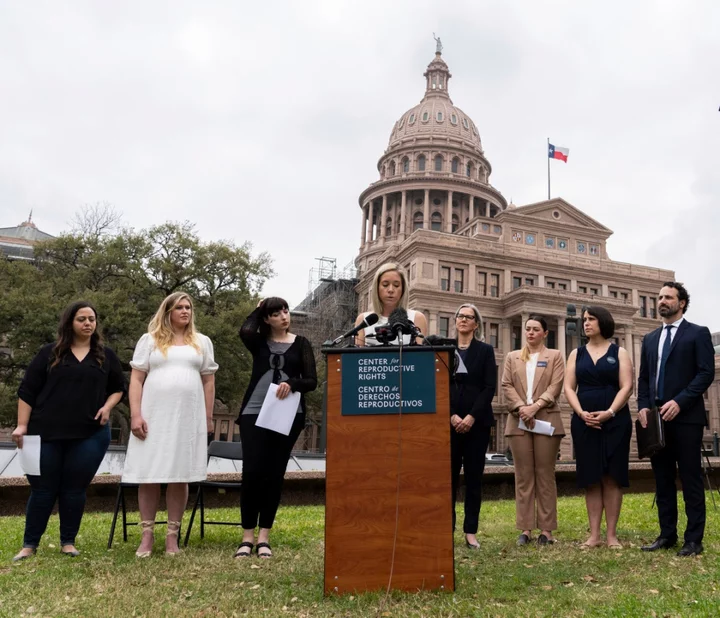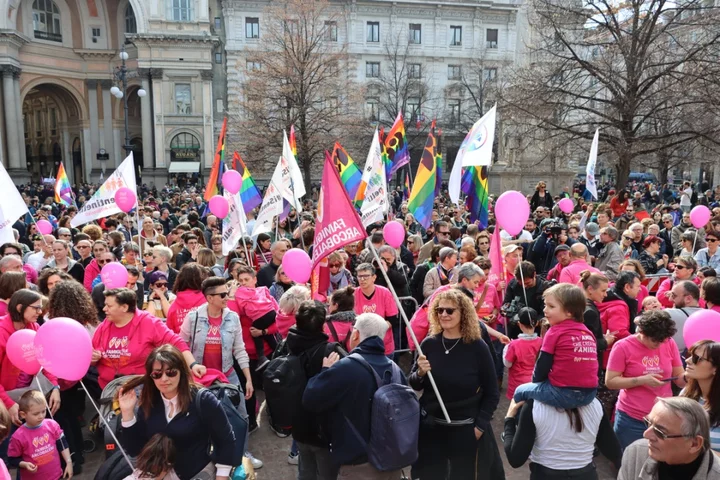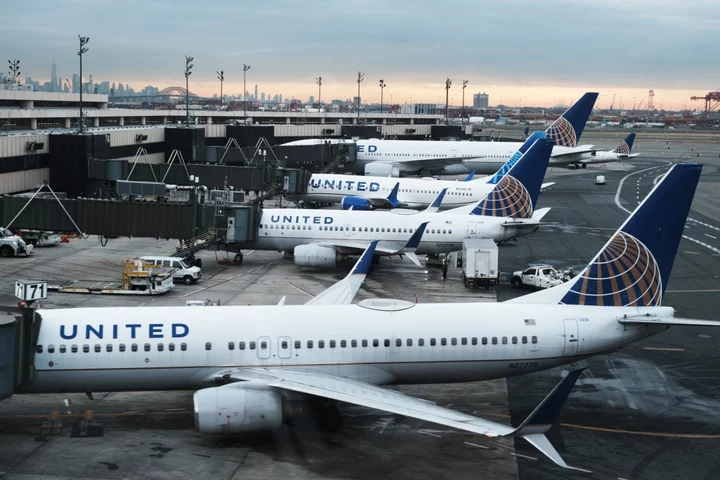
World’s Best Airport Changi Sees Traffic Soar to Over 5 Million
Singapore’s Changi Airport, ranked the best in the world, saw passenger traffic surge close to pre-pandemic levels last
2023-07-20 15:27

EasyJet Beats Estimates; Sees Strong Momentum Despite Strike
EasyJet Plc reported fiscal third-quarter profit that beat analyst estimates and predicted strong demand into the end of
2023-07-20 14:52

Wheat Extends Surge as Russia Threatens Ships Headed to Ukraine
Wheat kept rising — following the biggest daily surge in a decade on Wednesday — as Russian threats
2023-07-20 14:49

London’s Bars, Restaurants Face $270 Million Hit From Strikes
A wave of strikes on Britain’s rail network and the London Underground will cost bars and restaurants in
2023-07-20 12:15

Texas women suing over anti-abortion law give historic and heartbreaking testimony in a landmark court case
In March, unable to legally obtain abortion care in Texas, Samantha Casiano was forced to carry a nonviable pregnancy to term, and gave birth to a three-pound baby who died hours later. Ms Casiano is among 13 women denied emergency abortion care under state law who are suing the state in a landmark case that is now in front of a Texas judge. In harrowing, historic courtroom testimony in Austin on 19 July, Ms Casiano and two other plaintiffs described their agony, isolation and heartbreak as they detailed their traumatic, life-threatening pregnancies and the state’s failure to care for them. As she described her experience to the court through tears, Ms Casiano vomited from the witness stand. “I watched my baby suffer for four hours,” she said in her testimony. “I am so sorry I couldn’t release you to heaven sooner. There was no mercy for her.” Abortion rights legal advocacy group Center for Reproductive Rights Texas filed the lawsuit on behalf of the women in March to force Texas authorities to clarify emergency medical exceptions to the state’s overlapping anti-abortion laws, marking the first-ever case brought by pregnant patients against such laws. Their testimony has underscored the depth of impacts from Texas laws and similar anti-abortion laws across the country, with abortion access stripped away for millions of Americans who are now exposed to dangerous legal and medical minefields during their pregnancies. The conflicting exemptions for medical emergencies in Texas have resulted in widespread confusion among providers and hospitals fearing legal blowback or severe criminal penalties, according to abortion rights advocates. Healthcare providers in the state found in violation of those laws could lose their medical license, face tens of thousands of dollars in fines, or receive a sentence of life in prison. The plaintiffs “suffered unimaginable tragedy” directly because of the state’s anti-abortion laws, Center for Reproductive Rights attorney Molly Duane said in her opening arguments. Texas officials and the state’s medical board have “done nothing” to clarify the law, she said. “I feel like my hands are tied,” said Houston obstetrician-gynecologist Dr Damla Karsa. “I have the skill, training and experience to provide care but I’m unable to do so. It’s gut-wrenching. I am looking for clarity, for a promise that I’m not going to be prosecuted for providing care.” Attorneys for the state have sought to dismiss the case altogether, arguing in court filings that the women lack standing to challenge the law because it is ultimately uncertain they will face similar complications again, that their “alleged prospective injuries are purely hypothetical”, and that some of the plaintiffs admitted they have since “struggled to become pregnant” again after their traumatic experiences. Amanda Zurawski, the lead plaintiff in the case, is still hoping to become pregnant after her life-threatening pregnancy. She called the state’s argument “infuriating and disgusting and ironic.” “Do they not realise the reason why I might not be able to get pregnant again is because of what happened to me as a result of the laws that they support?” she told the court. “Anybody who’s been through infertility will tell you it is the most isolating, grueling, lonely, difficult thing a person can go through.” ‘I wished I was dreaming. I knew I wasn’t’ Ms Casiano, a mother of four, was hoping for a girl. When she visited her physician for a checkup last September, “all of a sudden the room went cold” and quiet, she testified. Her daughter was diagnosed with anencephaly, a fatal birth defect in which a baby is born without parts of a brain or skull. “My first thought was … ‘maybe it’s a surgery, maybe she can be fixed,’ and then she said, ‘I’m sorry, but your daughter is incompatible with life, and she will pass away before or after birth,’” Ms Casiano said. “I felt cold,” she said. “I was hurt. I wished I was dreaming. I knew I wasn’t. I just felt lost.” A case worker at her obstetrician’s office gave her a pamphlet with funeral homes. She was prescribed antidepressants. She could not be referred for abortion care anywhere in the state. Texas was the first to implement a near-total ban on abortion, months before the US Supreme Court struck down the constitutional right to abortion last June, a decision that triggered a wave of state laws and legislation from anti-abortion lawmakers and governors to restrict care and threaten providers with criminal penalties. Amanda Zurawski endured several rounds of fertility treatments, tests, surgeries and misdiagnoses before learning she was pregnant in May of last year. “We were at first in shock … we were over-the-moon excited,” Ms Zurawski said. But her obstetrician discovered that she dilated prematurely, and soon after her membranes ruptured, draining amniotic fluid and endangering the life of her expected child. Doctors informed her there was nothing they could do under what was recently enacted state law, despite knowing with “complete certainty we were going to lose our daughter,” she said. The condition led to life-threatening sepsis. Doctors ultimately induced labor. Her daughter, which she named Willow, was not alive when she delivered. Ms Zurawski and her husband are still trying for pregnancy, but the trauma has closed one of her fallopian tubes, and a doctor had to surgically reconstruct her uterus. They also are considering in vitro fertilization, surrogacy and adoption. She previously testified to members of Congress about her experience, a story she will continue to tell, even if it is “excruciating” to do so, she told the Texas courtroom. “I know that what happened to me is happening to people all over the country. … So many people are being hurt by similarly restrictive bans,” she said. She has spoken out “because I can, and I know a lot of people who are experiencing or will experience something similar who can’t speak out, and it’s for those people I will,” she said. Healthcare providers caring for pregnant patients in the months after the Supreme Court’s decision to overturn Roe v Wade have faced severe obstacles for providing standard medical care in states where abortion is effectively outlawed, leading to delays and worsening and dangerous health outcomes for patients, according to a first-of-its-kind report released earlier this year. Individual reports from patients and providers like those named in the Texas lawsuit have shed some light on the wide range of harm facing pregnant women in states where access to abortion care is restricted or outright banned. But reporting from the University of California San Francisco captures examples from across the country, painting a “stark picture of how the fall of Roe is impacting healthcare in states that restrict abortion,” according to the report’s author Dr Daniel Grossman. More than a dozen states, mostly in the South, have effectively outlawed or severely restricted access to abortion care after the Supreme Court’s decision in Dobbs v Jackson Women’s Health Organization last June. The decision has also opened new legal challenges, ones that could once again reshape the future of abortion access in America, while anti-abortion lawmakers and Republican candidates face a public that is overwhelmingly against such bans. ‘I don’t feel safe to have children in Texas anymore’ Ashley Brandt sent a picture of an ultrasound to her husband when she found out she was pregnant with twins. But after her 12-week ultrasound last May, doctors discovered one of the twins had acrania, in which the skull of the fetus is not formed, and brain tissue is exposed to amniotic fluid. The condition is fatal. Despite no chance of the twin’s survival, Ms Brandt was not eligible under Texas law for a procedure called a selective fetal reduction; Twin A still had some signs of life, like muscle spasms and cardiac activity. They traveled to neighbouring Colorado for care, and she returned home the day after the procedure. She gave birth to her daughter in November. “If I had not gone out of state and just done what was legal in Texas, my daughter … would likely have been in the [neonatal intensive care unit],” she said. “All of my ultrasounds leading up to labor I would have had to watch twin A … deteriorate more and more, every ultrasound. … I would have to give birth to an identical version of my daughter without a skull, without a brain, and I would have to hold her until she died, and I would have to sign a death certificate, and hold a funeral.” She said the state has failed to account for medical emergencies like hers. “I don’t feel safe to have children in Texas anymore,” she said. “It was very clear that my health didn’t really matter, that my daughter’s health didn’t really matter.” Read More ‘I felt I couldn’t tell anyone’: The stigma of abortion keeps women silent. It’s time for us to shout Ohio voters are likely to decide the future of abortion rights One year after Roe v Wade fell, anti-abortion laws threaten millions. The battle for access is far from over
2023-07-20 08:50

Italy begins removing gay mothers from children’s birth certificates
Italy has begun removing the names of gay mothers from their children’s birth certificates, as part of the right-wing government’s crackdown on same-sex parenting. The move comes after populist prime minister Giorgia Meloni’s coalition announced in March that state agencies should no longer register the children of same-sex couples, a move that sparked protests in Milan. Families have begun receiving letters from the state prosecutor, with PinkNews reporting that 27 parents in the northern city of Padua have been issued notices that they were being removed from their child’s birth certificate. Other families have received letters in Milan, Florence and Fiumicino, near Rome. Michael Leidi and her wife Viola were reportedly among one of the three lesbian couples to be targeted by the crackdown, with Ms Leidi telling LGBTQ+ Nation that she “cried for 10 days” after receiving the letter. It informed them that the inclusion of Ms Leidi’s name was “contrary to public order”, as she was not the biological mother of the couple’s daughter Giulia, the site reported. The policy means only the recognised biological mother has parenting rights, and if she was to die, her children can be handed to relatives or taken into the state’s care. “It was as if I did not exist,” Ms Leidi told LGBTQ+ Nation. “I suspect the government is afraid that a family that looks different, like ours, can be happy - maybe even happier, sometimes - as a traditional family. “On paper, they say Guilia has one mother but we know she has two. We will do everything possible to prove we are a good family.” Speaking to the Daily Mail, Ms Leidi said that the couple had been together for 11 years and were both teachers of children with special needs. After Viola became pregnant through artificial insemination, their local mayor had signed Giulia’s birth certificate and had been “very supportive”. Despite this, they were recently sent a letter informing them of the changes to the birth certificate. It was followed by an unsuccessful legal attempt to overturn the removal of her name and a rejection by local judges of their bid to take the case to Italy’s Supreme Court. Italy’s first female prime minister had rallied against the ‘LGBT lobby’ and ‘gender ideology’ as part of her successful campaign last year to win power. Despite Ms Meloni comparing herself to British Conservatives and denying she is homophobic, her party rose to power with tough rhetoric against same-sex parenting and support for traditional families and moral values. In a recent speech, she said: “We want a nation in which – whatever each person’s legitimate choices and free inclinations may be – it is no longer a scandal to say we are all born from a man and a woman.” Her coalition partner, Matteo Salvini, of the far-right League party, had previously called gay parents “unnatural” while the government opposed a Brussels plan for a parenthood certificate that would be valid across the EU. In 2016, Italy’s former centre-left government legalised same-sex civil unions, however stopped short from issuing full adoption rights following opposition from the Catholic church. Gay couples are forced to go abroad if they want children, as they are banned from accessing reproductive medical treatment such as IVF and surrogacy is also prohibited. Italian law does not rule if same-sex couples can both be recognised as parents on official certification, which meant local mayors were left to make the call based on their own personal views. However, now the message from the interior ministry to town halls is that such arrangements are illegal. This follows a Supreme Court ruling last December against a male same-sex couple who brought a child obtained through surrogacy into Italy. Pro-LGBTQ politicians have condemned the move, arguing that it is clearly discriminatory. Elly Scheink, the leader of the centre-Left party, who is also in a same-sex relationship, said: “These families are tired of being discriminated against. “We’re talking about boys and girls already growing up in our communities and going to schools.” Meanwhile, a poll last month found that two-thirds of Italians hold positive views on same-sex parenting and adoption, demonstrating a surge of support in recent years. Read More UK Prime Minister Rishi Sunak apologizes for a previous ban on LGBTQ+ people in the military Russian lawmakers pass a bill outlawing gender-affirming procedures to protect 'traditional values' Thousands march at Budapest Pride as LGBTQ+ community voices anxiety over Hungary's restrictive laws Six-year-old boy and his 12-year-old sister drown in Texas river New drug to protect babies and toddlers from RSV gets FDA approval ahead of cold season Ban disposable vapes by next year, ministers urged
2023-07-20 04:51

United Air Raises 2023 Profit Outlook on Overseas Travel Demand
United Airlines Holdings Inc. raised the low end of its profit forecast for the year and said it
2023-07-20 04:30

NY MTA Raises Subway Fares for First Time Since 2019 to Fix Budget Deficits
New York’s Metropolitan Transportation Authority voted to lift prices on its subways, buses and commuter rails on Wednesday
2023-07-20 02:17

Wheat Rises 9% as Russia Issues Warning on Ships Headed to Ukraine
Wheat futures soared as much as 9%, the biggest jump since 2012, as Russia threatened ships sailing to
2023-07-20 01:51

Netflix Pulls Lowest-Priced Ad-Free Plan in the US and UK
Netflix Inc., which reports second-quarter financial results Wednesday after markets close in the US, stopped offering its lowest-priced
2023-07-20 00:59

Wesleyan Joins Small Group of Elite Colleges Banning Legacy Admissions
Wesleyan University is joining a select group of colleges that is ending preferences in admissions that favor children
2023-07-19 23:49

Sean ‘Diddy’ Combs Accuses Diageo of Retaliation in Fight Over Racism
Music mogul Sean “Diddy” Combs accused Diageo Plc of unlawful retaliation, extending his legal feud with the world’s
2023-07-19 21:58
